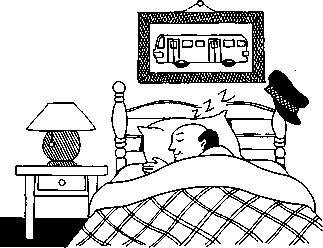Unit 2. Simple present (I do).
A.
Study this example situation:

Alex is a bus driver. But now he is asleep in bed.
So:
He is not driving a bus (he is asleep).
But: He drives a bus.
This is the simple present tense:
I/we/you/they drive
he/she/(it) drives |
We use the simple present to talk about things in general. We are not thinking only about the present. We use it to say that something happens all the time or repeatedly, or that something is true in general. It is not important whether the action is happening at the time of speaking:
The earth goes around the sun.
Nurses take care of patients in hospitals.
In Canada, most stores close at 6:00 p.m.
Remember that we say he/she/it -s. Don’t forget the s:
I work in a bank. Barry works in a department store.
B.
We use do/does to make questions and negative sentences:
| do I/we/you/they work?
does he/she/it work? |
I/we/you/they don’t work
he/she/it doesn’t work |
Excuse me, do you speak English?
“Would you like a cigarette?” “No, thanks. I don’t smoke.”
What does this word mean? (not What means this word?)
Rice doesn’t grow in Alaska.
For questions see also Unit 47.
C.
We use the simple present when we say how often we do things:
I get up at 8:00 every morning, (not am getting)
How often do you go to the dentist?
Ann doesn’t go out very often.
In the summer, Tom usually plays tennis twice a week.
D.
Note that we say “Where do you come from?” ( = Where are you from?):
Where do you come from? (not Where are you coming from?)
He comes from Japan, (not He is coming from Japan.)




